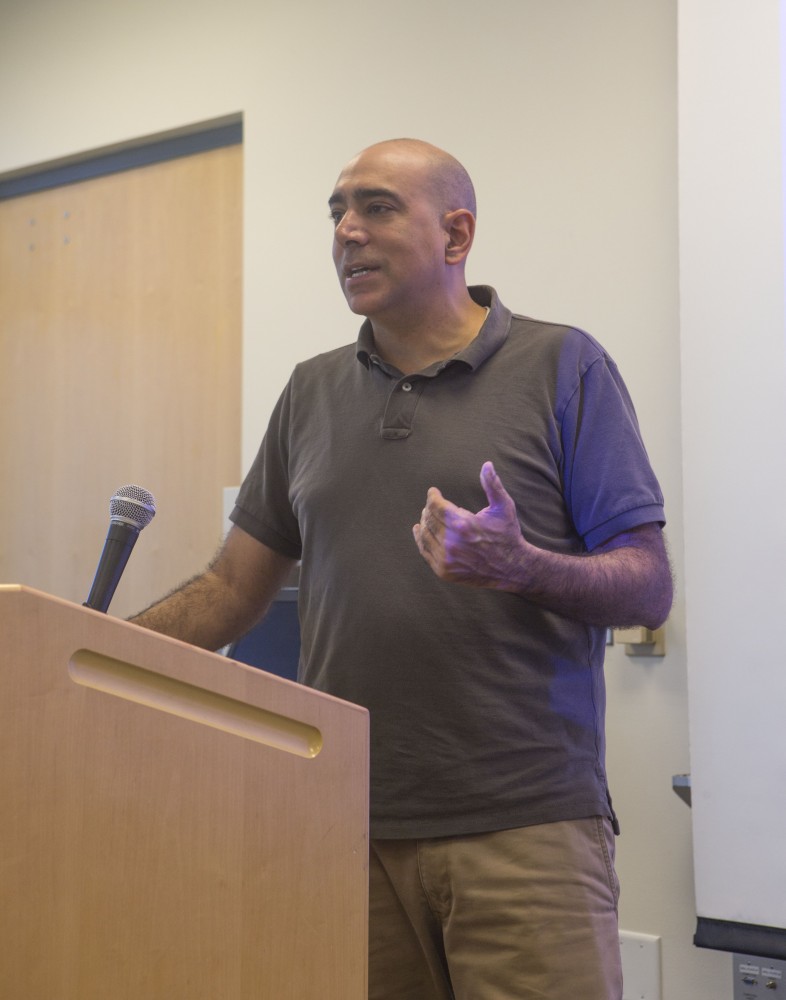Palestinian activist speaks about the plight of Gazan people

Sep 10, 2014
In light of the recent ceasefire agreements created between Israel and Palestine on Aug. 26, Ali Abunimah, executive director of The Electronic Intifada, an online publication that is known for its incisive coverage and advocacy of Palestinian people, politics and culture, came to speak to Grand Valley State University.
The discussion was sponsored by Healing Children of Conflict and co-sponsored by GVSU’s Middle East studies program, GVSU’s Peace M.E.ans and Hope Equals.
Abunimah’s lecture consisted of sharing his thoughts and charts, videos and pictures that sympathized with the plight of the Palestinian people in the Gaza strip.
He made himself available to answer questions and sign copies of his book “The Battle for Justice in Palestine.”
“The Gaza Strip is a very small part of Palestine,” Abunimah said. “There are 1.8 million people in Gaza.”
Abunimah said the Gaza Strip makes up 2 to 3 percent of the total land but holds 40 percent of the population.
Despite the small size, Abunimah said it can take a couple of hours to travel through Gaza due to a lack of convenient roads and other restrictions like checkpoints.
“For 51 days until Aug. 26 the Palestinians were subjected to round-the-clock bombardment from Israel,” he said.
Abunimah said that through his own personal research and calculations, Israel had dropped a large total of explosives on Gaza this summer, comparing the total power of the explosives to an atomic bomb.
Abunimah cited his own website and research as well as a series produced by the United Nations showing the destruction.
“They say (it is) simply unprecedented. There has been nothing like this in Gaza or in Palestine before,” he said.
In total, 2,168 Palestinians were killed with 521 of them being children. Over 12,000 people were injured, Abunimah said.
“If you were in Gaza between July 7 and Aug. 26, your chances of being killed by an Israeli bombardment was greater than one in 1,000.”
Abunimah scaled the number of casualties down to GVSU.
“That would mean that 24 of your peers- students, faculty, staff- would have been killed in that period,” he said.
Abunimah’s friends currently living in Gaza have suffered on a cultural scale as well and say travel and study are currently impossible.
“Several of my friends in Gaza sent me text messages saying ‘if I don’t survive this, I want you to know such and such,’ or ‘I want you to remember me,’” Abunimah said.
He said that even after the ceasefire, there is still very little humanitarian aid getting in.
“In a sense, things have gotten worse,” Abunimah said.
Abunimah said that there needs to be a political shift in the mentality towards the Israeli-Palestinian conflict.
“If you turn on T.V. or read the New York Times, you get a certain standard story,” Abunimah said. “Israel is the victim. You hear this from every member of Congress more or less. The senate voted 100-0 to support Israel’s attack with no political debate.”
Abunimah challenged the audience to think more critically, saying that the current atmosphere is unhealthy and will not allow people to hear both sides.
“How many issues do you think there are in this world, or in this country, where one group is 100 percent right and the other group is 0 percent right?”






















